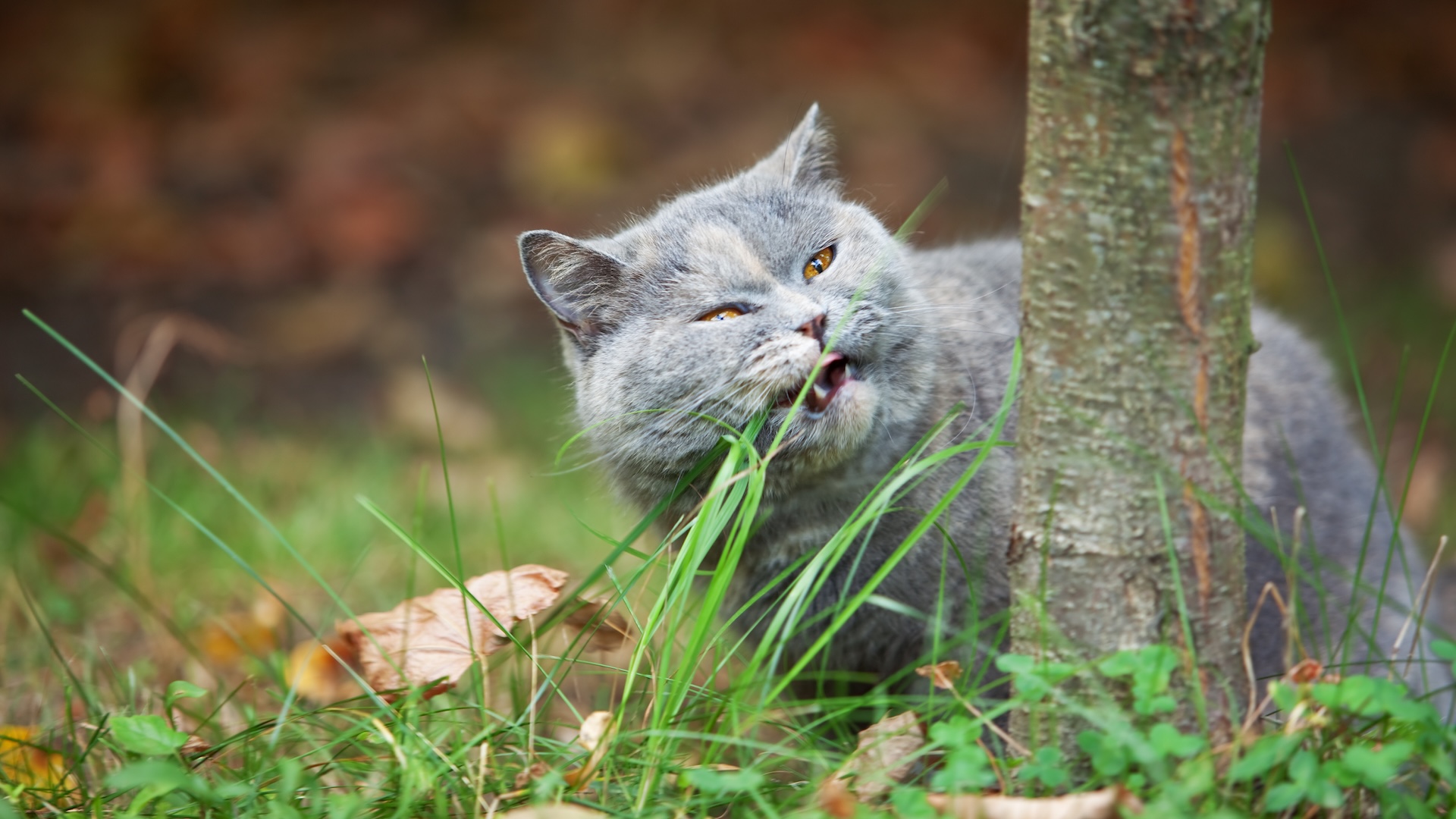You may have noticed that your dog or cat tends to munch on grass from time to time. This may seem like an unusual choice for a snack, especially for cats, which are carnivores. So why do our pets eat grass?
“There’s quite a few theories,” said Dr. Jamie Lovejoy, a veterinarian at Stack Veterinary Hospital in Syracuse, New York. “We do see grass-eating behavior in both dogs and cats, and these are two species that technically really don’t have the equipment to digest a lot of grass.” For instance, grass-eating species tend to have special gut bacteria that helps break down grasses’ tough cellulose, and many herbivores have multiple stomach chambers and a longer digestive tract to break down plant material.
One commonly repeated theory is that pets eat grass to settle an upset stomach, Lovejoy said. “Most of the time when it comes out, it comes out kind of unchanged, either by vomiting or defecation,” she told Live Science. “And so I think it inspires a lot of old wives’ tales.”
However, research suggests that sickness may account for only a small percentage of times cats and dogs eat grass.
In 2008, researchers asked several groups of dog owners about their pets’ grass-eating behavior. Of 1,571 owner responses to a web survey, 68% reported that their dogs ingested plants daily or weekly, yet only 8% said their dogs frequently showed signs of illness before eating the plants. Two similar surveys of cat owners published in the journal Animals in 2021 found that only 6% of cats in the first survey and 9% in the second survey appeared ill before eating grass, although 27% and 37% vomited frequently afterward. In the second survey, 71% of owners witnessed their cats eating plants at least six times.
The 2021 study also tested the idea that cats eat grass to help expel hair balls. Previous research had suggested that long-haired cats vomit up hair balls more often than short-haired felines do. Yet the study found “no evident difference” in the frequency of grass-eating behavior between the two groups.
Related: Why do cats throw up so much?
Researchers have observed grass eating in wild canines and felines too, which suggests it may be an innate behavior. Scientists have hypothesized that wild cats and wolves eat grass to clear their intestines of parasites, so perhaps domestic animals do the same.
“I think it’s a little bit of a hard theory to test, at least in the United States … because most of our pets really don’t have these high worm burdens,” Lovejoy said. “So it’d be hard to see.”
Despite grass having “no apparent nutritional value,” according to the author of the 2008 study, some scientists have posited that perhaps dogs and cats consume grass for micronutrients like B vitamins, said Dr. Lori Teller, a clinical professor at the Texas A&M College of Veterinary Medicine & Biomedical Sciences.
However, this likely isn’t the case for most pets on a well-balanced diet, unless the dog or cat has underlying health issues.
“If you have a healthy pet who is getting a well-balanced diet and occasionally decides to go eat some grass, nibble on catnip, things like that, then [there’s] absolutely nothing to worry about,” Teller told Live Science. “If they’re ravenous for these plants, or constantly eating them, or constantly eating them and then throwing up, then I would certainly be looking for an underlying problem.”
Scientific studies on grass eating in cats and dogs are relatively scant, due to a lack of funding, Lovejoy explained. Pets rarely have major health issues from eating a lot of grass, and veterinary research tends to focus on how to treat more serious problems.
“I think a lot of these questions are kind of technically unanswered,” she said.
But Lovejoy’s current theory is simple: Mostly, our pets eat grass because they want to — maybe they like the taste, want some stimulation or are exploring their environments.
“There is no one reason why cats and dogs want to or choose to eat grass,” Teller said. “There are probably as many reasons as there are different types of grass out there. Some dogs and cats just like it.”
While grass-eating behavior is mostly harmless, pet owners should know that certain plants are poisonous. Lovejoy recommends checking the American Society for the Prevention of Cruelty to Animals’ list of plants toxic to pets. Plants treated with certain chemicals may also be dangerous, so people should be cognizant of their use of pesticides and fertilizers. If pets are vomiting frequently or having abnormal stools, Teller recommends taking a trip to the vet.
